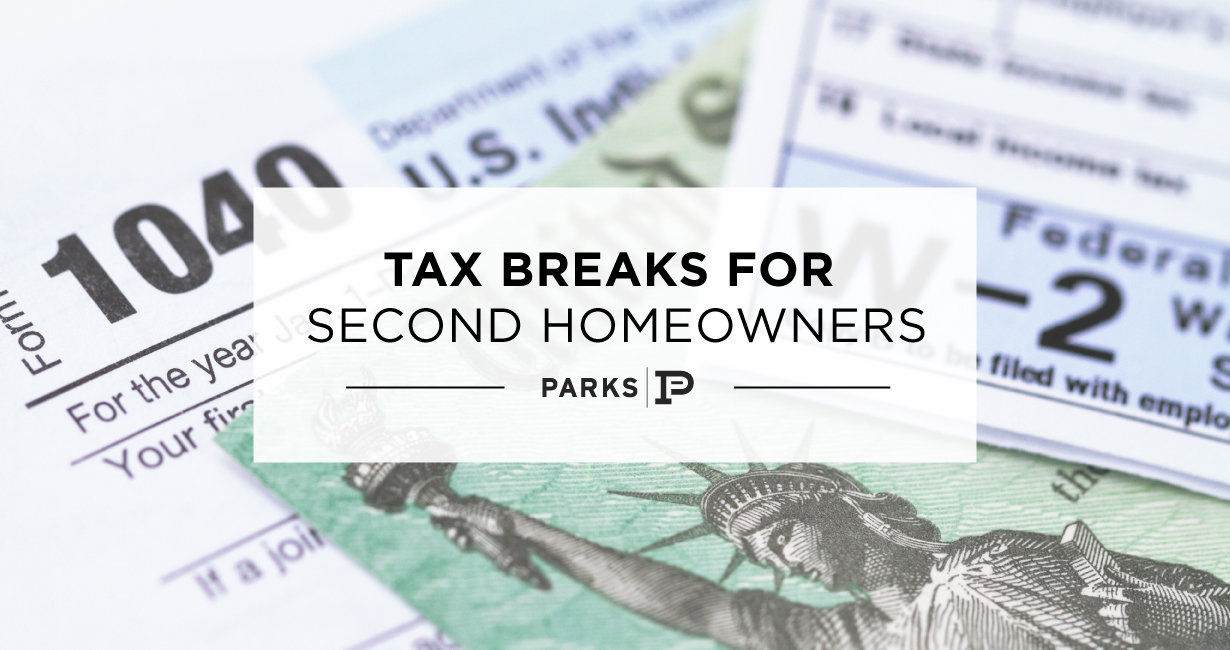Tax Breaks for Second Homeowners
Posted by Jenni Barnett on Friday, December 13th, 2019 at 10:14am.

In 2018, the US enacted significant tax reforms. Homeowners like you are among those who will have taken note of these changes, and may be wondering: under the new code, what are the tax breaks for second homeowners? Does it matter whether the second home is going to be a rental or a vacation getaway, or whether it’s a boat or a chalet?
When comparing the new tax code to the pre-2018 rules, there are four key ways the new tax code affects second homeowners. If you’re considering buying a second home or want to know how the new rules will impact your plans for an Airbnb income stream, read on! Our team at Parks has the information to help you second homeowners make the most of each potential tax break in 2020.
1.) Tax Breaks on Second Homes for Personal Use
If you are planning to use your second home as an additional residence for your or your family’s personal use only, without renting it out in any capacity, you may deduct your mortgage interest, just as you currently do with your primary residence.
However, unlike pre-2018 tax years, the limit on the interest you pay has been reduced. Previously, individuals who owned two homes could write off the interest paid on up to $1.1 million between the first and second properties. Post 2018, interest deductions have been capped at $750,000.
The new rules may not improve your tax situation if you’re planning to purchase a second high-end home, but there’s some wiggle room: if your loan or binding contract was created prior to December 16, 2017, the interest limit remains unchanged.
2.) Tax Breaks for Rental Properties
There are different rules for rental properties depending on whether or not they are rented out for 15+ days or 14 days or fewer. If you rent your home for 14 days or fewer per year, you may enjoy your earned rental income tax-free! The amount you earn does not influence this rule; whether you’re charging $250 per day or $15,000 per week, you are permitted to keep it all.
Once you rent your home for 15 days per year or more, the rules change, and all rental income must be reported for taxation. On the other hand, you will be able to deduct your rental expenses, including all property management fees, provided you have properly tracked your costs and the dates your second home was rented.
There’s a catch, though: if you’re in your second home (and yes, boats do indeed count) more than 14 days per year, or more than 10% of the days it’s rented (whichever is greater), it can’t be considered a rental property. If it’s not a rental property, it’s a personal residence, and must be taxed as such.
If you would like to stay in your second home more often, but want to deduct rental expenses, there’s one commonly-employed loophole that we can recommend ducking through: days you spend working on home maintenance can’t be counted as one of your 14 available days. In fact, you can hang out at your vacation home for an entire week, providing you were keeping your home ship-shape at the time. Take your time; even work done at a leisurely pace counts!
3.) Property Taxes on Second Homes
While homeowners are still permitted to deduct property taxes paid on their first and second homes (and eighteenth and hundredth homes, for that matter), the total of state and local taxes—property taxes included—is now limited to $10,000 per tax return filed.
4.) Standard vs. Itemized Deductions
While today’s information is important and well worth considering, it’s also true that it won't apply to you at all if you aren’t planning to file an itemized tax return. The standard deduction was more than doubled under the new reforms, which means fewer people will have reason to itemize their returns.
The standard deduction is built into tax law, which means homeowners needn’t provide any proof of expenses when they claim it. This year, the standard deduction amounts are as follows:
- $12,400 for those who live alone
- $18,350 for heads of households
- $24,400 for couples who are married, filing jointly
While this change might seem neutral or positive, it can actually be a problem for those whose mortgage interest and property taxes are only worthwhile when itemized. Consider whether your second home would be worth as much as, or more than, the standard deduction to which you are already entitled.
The Takeaway
Homeownership is a sound, yet exciting way to invest your wealth, but it is still prudent to consider every financial implication when you are planning your home purchases. While a second home usually represents a beneficial tax decision, it’s crucial to consider your current deductions in light of the new tax rules.
Should you choose to purchase a second home, take advantage of a few of those leisurely weekend maintenance days and enact some DIY improvements. After all, selling a second home guarantees a terrific tax benefit—at least until 2025, which is when the current rules expire.
Have your plans for your second home changed as a result of the new tax rules? Let us know in the comments below.







